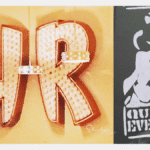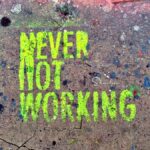There’s been some ongoing discussion here, here, here (and most recently here and here) about the human resources profession. In fact, there’s been so much discussion lately, I can barely keep up with it. If I missed a link to your post…my apologies. All of the convo is thought provoking and definitely worth checking out (especially the comments.)
I’ve written my fair share about the profession. In fact, my very first post on this blog was about the perception of HR.
[WARNING: Rant Ahead]
But, I think we need to draw a distinction between the people in the profession and the profession itself. Every profession has rock stars and crappy performers. Every. Single. One. No exceptions. That doesn’t mean a particular profession is dead or dying. Nor does it mean the profession needs to reinvent itself. It does mean we need to hold those people who are doing a crappy job accountable. (Don’t be surprised to see a part two of this post in the near future…dealing with the non-performers.)
Professions change and evolve all the time because the nature of business changes. When Knowledge Management was introduced as a business concept, someone in the company had to own it. That involved some department changing their responsibilities within the organization. Same now goes for social media. Departments are evolving to incorporate this powerful business tool into their profession. As these business shifts occur, we want to remember the key elements to successfully dealing with change: embracing the change, educating and training to deal with the change, and adapting to the new normal.
So, that being said about professions and change in general, let’s talk specifically about the human resources profession…
Tactical things like department size, centralized or decentralized functions, generalists or specialists are all immaterial in a discussion about the profession. The first question we should be asking is – what should HR be responsible for? Once you know that, then you can debate department structure, individual roles and responsibilities, etc.
Here’s my two-cents…human resources is the marketing department for internal clients. If you look at the definition of marketing (as defined by the American Marketing Association), it says: “Marketing is the activity, set of institutions, and processes for creating, communicating, delivering, and exchanging offerings that have value for customers, clients, partners, and society at large.”
So, what should HR be responsible for? Those activities and processes that have and create value for employees and prospective employees.
As much as it pains me to say it, HR has responsibility for company picnics and reconciling insurance premiums … and probably always will. It’s just part of the job. But those tasks are tactical and shouldn’t consume all of our time. We should be using our voices and spending the majority of our time discussing the real issues that keep our CEO and COO up at night like “Are our revenue producers planning to stay with the company?” and “Who are our future leaders?” These are areas that have real significance and value to our businesses – and the people in them.
I’m by no means saying human resources is perfect…because it’s not (nor is any other department). But, I’d like to see the conversation about the profession focus on the future of work, which is what human resources should be all about.
0







Bonita says
Great post, Sharon! I love the combination of Marketing and HR. When asked what my job is, I say that it’s anything to do with people. Could be party planning, insurance premiums, skill sets needed for the future, training, retention or communication. There are outsourced companies to handle some of the transactional HR duties for us so that we can get to the REAL people issues that will impact our business.
Bonita says
Oops! Spellcheck changed Sharlyn to Sharon. You’d think that I would be more aware since it happens to my name all of the time. Sorry, Sharlyn! 🙂
Michael VanDervort says
Hi Sharlyn,
Thanks for mentioning my post among all the other contenders for Wanted HR: Dead or Alive! It could be the next big reality based game show, like the Greatest Race..
Actually, I think you make a very strong point with your thought that what we do in HR should be about the work. I am slightly less down with you on the “marketing” concept because I think marketing for internal clients is just a smal part of what HR does. We are also the mediator, the consigleire, the advisor, the confidante to the organization.
We may actually have the most diverse and under-valued power position there is inside any organization. However, since much of what we contribute is intangible and deals with people and not widgets, …bla bla bla.
Frank Roche and I will be guests on #HR Happy Hour this week with Steve Boses, discussing the “Death of HR”. . Maybe you can call in, and expand on your marketing thoughts!
hr bartender says
Thanks Bonita and Mike for the comments.
I agree that HR is moving toward more project and vendor management (and sending transactional duties outside the organization.) I only wish more conferences would focus on offering professional development in these areas.
My thought is that roles like mediator, advisor, confidente, etc. have a tendency to be driven by the person, versus the function. But I agree it would be great if everyone had the skill set to perform the role.
Unfortunately, I will have to miss the lively discussion on this week’s HR Happy Hour. I’ll be on a plane, returning from a couple of speaking engagements. But for everyone else, be sure to tune in this Thursday, October 29, 2009 at 8:00 p.m. EST where Steve Boese and Shauna Moerke will be hosting a convo about “Is HR Dead?” (The dial in number is 646.378.1086)
Steve Boese says
I am so glad you weighed in on the discussion, Sharlyn. This is a topic that definitely elicits some strong opinions and great discussions. As Mike mentioned, this is the topic if the HR Happy Hour this week, and I know you have a busy schedule, but it would be fantastic if you could join in on Thursday.
Steve Boese says
Sorry, Sharlyn, it looks like I was writing my comment as you were writing yours!
Michael Haberman, SPHR says
Hey Sharlyn:
I too am of the school that HR is not dying, if anything it is more dynamic than ever before. The role of HR is increasing not going away. However, I also agree with Mike Vandervort that I think it is more than just marketing. It is also a planning function. It is a control function. It is a communication function. It is an educational function. It is an administrative function. It depends on what your particular role happens to be. In reality it is not a function at all. It is a system that has to operate in conjunction with the other systems of the company or organization. My particular area of expertise happens to be the compliance part (and that to me remains a big role of HR, especially with 14 pieces of HR related legislation pending), but I don’t forget the systems approach that meshes it all together.
I like your accountability message. I look forward to your next post, because I run into far to many HR people who do poor HR, either because of lack of desire or lack of knowledge.
Keep up the message.
hr bartender says
Thanks for the comments. (Steve –I’m really bummed that I’m going to miss this week’s call…it’s sure to be a good one!)
I totally agree that human resources involves planning, control, communication and education. In my experience, marketing involves all of those things as well: planning marketing strategy, control of brand messaging, tons of communication (advertising and PR), and customer education. Same to differing degrees with accounting, operations and every other department in a successful organization.
Sue Meisinger says
I loved this post. I am so tired of the whole “how to get a seat at the table” conversation. Get over it people!
I particularly liked your point that HR will probably always have a role in setting up the picnic or reconciling an insurance issue. It just goes with the territory. The challenge for the profession is not to allow that aspect of the role to define them as a professional. View it as a baseline competency — because if you don’t get the tactical right, (which means accurately and cost effectively) it doesn’t matter how strategic you are. You won’t have credibility.
I met and spoke with literally thousands of HR professionals during my career, and one of the challenges I saw for many was that while they were approaching their role strategically, they frequently used HR language to articulate their activities. It was more than not “speakuing the language of business” — it was how they framed issues on an every-day basis.
Finally, I often think we’re not as honest as we need to be in describing the profession to those considering it for a career. Every HR professional has cringed when someone tells them they’d like to be in HR “because they like working with people.” Ach. But do we tell potential HR professionals that they need to realize that the nature of this career is that it is very personal: decisions and strategies they develop and execute will touch individual lives, and there’s no way everyone will like them, so they need a thick skin. If they expect to be able to have everyone like them, it’s the wrong profession for them.
It’s what makes the profession so unique. An accountant makes and error, and you can reverse the numbers. Marketing messes up, and it just reduces sales. Research makes a mistake, and there’s no new product or the product fails. But if HR gets in wrong, there’s a person, somewhere, at the other end of the decision.
Great post Sharlyn. Sorry to rant in response.
Sue
Mark F. says
If we are talking to our C suite we are half way there, delivering is the second half. I think the profession is doing ok on part 1, not sure about delivery…mixed reviews….but that means there is opportunity to improve in the future…I am an optomistic that the profession will thrive in the future…I find many companies are listenining to the HR team…thats encouraging, and Hr leadership is talking the language of Business more and more too!
great post!
M
Karla Porter says
This is a very passionate post as are many of the replies. The profession has undergone several serious changes since the beginning of personnel relations offices in the 1920’s, wartime and the National Labor Relations Act, post Korean War struggle for desegregation. Now we face the challenge of today’s business environment to understand and manage the important interaction of technology, work, flow, organizational strategies and, most important, people.
Such frequent change keeps us on out toes. It’s dynamic, painful and wonderful. It’s like Madonna’s Reinvention Tour only not as glamorous.
hr bartender says
Thanks for contributing to the conversation. It’s great to see so much experience and so many perspectives.
I really like Sue’s point that we can’t let the tactical tasks define our role as professionals. Which ties into Mark’s comment about execution…if all we talk about and demonstrate are the administrative sides to our role, that’s all they will come to expect from us.
And Karla – I totally agree that it keeps us on our toes. We just have to stop beating ourselves up and move forward in a positive direction. That in itself might be pretty darn glamorous.
Meg Bear says
“Every profession has rock stars and crappy performers. Every. Single. One. No exceptions. ”
Amen Sister!
-Meg
Kevin Brozovich says
Sharlyn,
I just found your blog and really love it. It’s sad that HR people have such a bad reputation. I still see a lot of places where the HR department is lead by the person who was the best receptionist/AP clerk/payroll person. We don’t expect people to become accountants or engineers without training, why do we think they can automatically do HR?
Kevin
hr bartender says
Kevin – thanks for the comment and kind words about the blog. There’s a lot of discussion going on about the profession and you raise an excellent point.
As one of those people who “fell into” human resources, it’s essential that, at some point, some sort of formalized education occurs. I started my HR career calculating and auditing vesting for the company’s ESOP plan. But once I decided that I enjoyed HR and wanted to stay in HR, my company supported me by allowing me to attend workshops, classes and conferences. This gave me the educational foundation to be successful.
But that was back in the day when there were no human resources degree programs. Now that colleges and universities are offering degrees, should that be a requirement? Do you need a degree to be an HR professional?
Kevin Brozovich says
Sharlyn,
You do ask the fun questions, don’t you? I find that my HR degree helps me a lot. I was lucky enough to get my degree back in the 80’s at a school where our professors were mainly retired HR execs. One of my first, and favorites, told us about how he hired thugs to beat the union organizers – while not a great business model to follow, it gave us some great insight into why things are the way they are.
So, do you need a degree? My first preference is yes, but I know several very successful HR people with degrees in other fields who took the time to learn the technical skills required to be great in HR. It certainly can be done.
Have a great holiday!
hr bartender says
I totally agree that you can be successful in HR from a variety of educational backgrounds. Maybe that’s the benefit (or challenge) depending upon how you look at it.
Happy Holidays everyone!
BV Prasad says
A good piece of information on HR Profession. Recently, I came across a website http://www.hrqs.org which specified certain standards to be followed voluntarily and use a logo HR Professionals provided the said standards are followed. It is quite interesting. There is no fee or what so ever. HR Professionals and HR Consultants can use the logos freely. There is no third party certification also. Only self-certification is needed. As I liked your blog on HR Profession and a budding HR Professionals, I would like to have an expert opinion from you on the HR Quality Systems available freely at http://www.hrqs.org. As it appears some one has put in efforts to lift the image of HR Profession through these standards. Can you please guide me? BV Prasad
Affan Aijaz says
Hey,
Can you please tell me something about the combination of HR and Marketing? Many of the professionals are saying that now the time has reached when HR and Marketing are combined and if they want to achieve goals they have to work together. So what do you think that how both of these fields go together in the future?